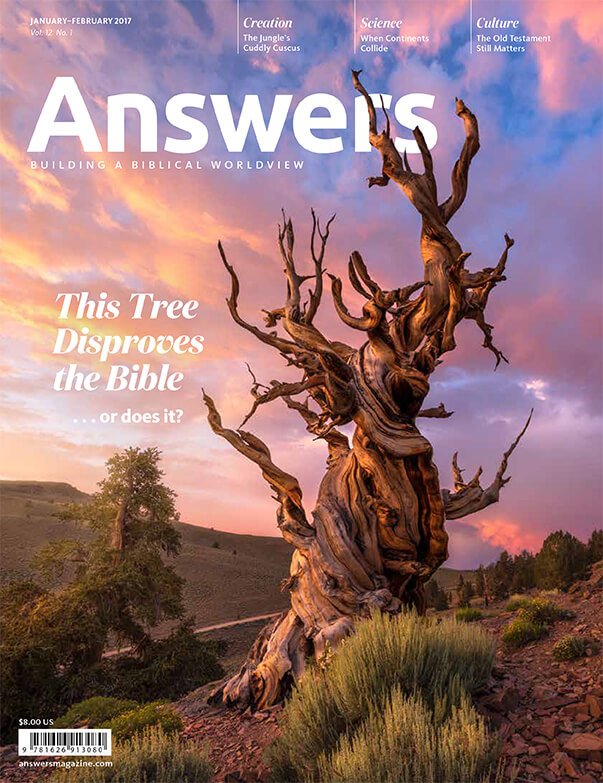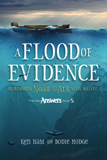The Old Testament Still Matters
One reason young adults are leaving the church is that they don’t understand the Old Testament. What can we do to help them?

illustration by Viktor Miller-Gausa
Ken Ham
President/CEO
Answers in Genesis
It comes as no shock to hear that young people—especially Millennials—are leaving the church in the US in great numbers. George Barna reports that “more than two-thirds of skeptics have attended Christian churches in the past.” So what happened?
Well, according to research conducted by America’s Research Group for my book Already Gone, one major issue is a lack of apologetics teaching. Millennials have not been taught to defend their faith, and the world’s scoffing and arguments have drawn them away. But it goes deeper. Our young people don’t even know what the Bible teaches or that its grand narrative, beginning in Genesis, points to salvation through Jesus Christ (Genesis 3:15).
These biblically uninformed young people do not understand the purpose of the Old Testament, so they think the church is just picking and choosing what parts of the Bible to obey.
These biblically uninformed young people do not understand the purpose of the Old Testament, so they think the church is just picking and choosing what parts of the Bible to obey. When pastors use Old Testament terminology such as “come to the altar,” they reinforce that idea.
Now there’s nothing wrong with using Old Testament terminology. Indeed, New Testament authors frequently did. But if a writer was addressing a largely Gentile audience (people not acquainted with Jewish history and beliefs), he would avoid using Old Testament terms or would explain them carefully. If he was writing to a Jewish audience, he could easily refer to the temple, sacrifices, priests, and so on because they had the foundational knowledge to understand him.
In the book of Acts, we read two very different sermons, one by Peter and one by Paul. At Pentecost, Peter delivered a powerful sermon in Jerusalem (Acts 2:14–40). This sermon was full of Old Testament quotations and themes because the audience was Jewish and had an Old Testament background. In Acts 17, Paul was addressing Greeks in far-away Athens. Although he started with the Creator revealed in Genesis, his sermon was not full of Old Testament quotations because his Gentile audience knew little or nothing of the Old Testament. Though highly educated, they were biblically illiterate. Paul understood his audience and tailored his message accordingly.
In a sense, the West used to be a “Jewish” audience. Many unbelievers knew biblical history and largely believed the Bible had at least some authority. But today, most Millennials who have grown up in the church do not know the Old Testament well. They are no longer “Jewish” but “Gentile” in their thinking.
To minister to modern-day Gentiles, we need to help them understand the vital nature of the Old Testament. It provides the history that the New Testament and the life of Christ on earth is based on. It reveals the origin of our sin and our desperate need for Jesus the Savior.
In Genesis we learn that God created a perfect world, but Adam and Eve brought death and suffering by their sin. Their descendants likewise chose disobedience. The world became so wicked that God judged it with a global Flood. Only righteous Noah and his family survived. Just a few generations later, at the Tower of Babel, mankind rebelled again. Eventually God chose a covenant people and gave them His law. They failed to live by it time and time again. This history clearly shows we cannot keep God’s laws on our own.
With this backdrop, the New Testament teaching of salvation and restoration through the death and resurrection of Jesus Christ makes sense. Salvation is by faith alone (Ephesians 2:8), in Christ alone (Acts 4:12). What we could never do on our own, Christ did for us (Ephesians 2:9). Throughout the Bible we see the unfolding of God’s plan of salvation. It’s about Jesus from beginning to end!
The Mosaic Law does the same thing. It highlights our inability to keep God’s commands. The sacrifice of animals and the priesthood were pictures of Christ who was to come. Jesus, through His death, burial, and resurrection, has made the first covenant obsolete (Hebrews 8:13) and has brought us into the New Covenant (Luke 22:20) foretold by the prophet Jeremiah (Jeremiah 31:31).
God does not change (Hebrews 13:8). But this doesn’t mean rules or punishments can’t change. For instance, man was created vegetarian (Genesis 1:29). But following the Flood, God made a new covenant with Noah, allowing man to eat meat (Genesis 9:3). The Mosaic Law included dietary restrictions (Leviticus 11:47), but the New Covenant lifted them (Acts 10:9–16). Since there won’t be any death in the new heavens and new earth, we know we will be vegetarian once again (Revelation 21:4). Did God change? Not at all. But God’s rules for us can change under various covenants.
The Old Testament, especially the Mosaic Law, seems to be a big stumbling block to Millennials because they aren’t receiving the instruction fundamental to understanding the redemptive history of the Old Testament and how it undergirds the person and work of Jesus. Christian leaders, pastors, teachers, and parents need to teach others how to view the Old Testament and the Law as Christians under the New Covenant. Be sure to use the Old Testament—it forms the basis for our theology—but make sure your audience understands how to view it so they can grow in the knowledge of Christ and in godliness.
Answers Magazine
January–February 2017
Secular scientists claim it’s easy to disprove the Bible’s 6,000-year history: just count the tree rings. But this dating method is not as reliable as you might think.
Browse IssueRecommended Resources

Answers in Genesis is an apologetics ministry, dedicated to helping Christians defend their faith and proclaim the good news of Jesus Christ.
- Customer Service 800.778.3390
- Available Monday–Friday | 9 AM–5 PM ET
- © 2026 Answers in Genesis




